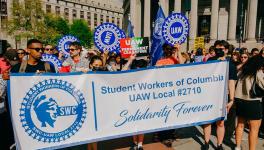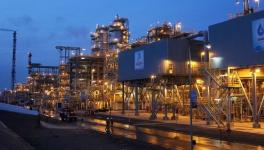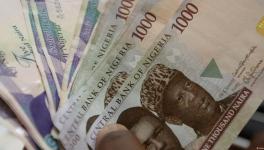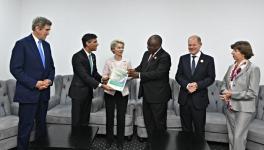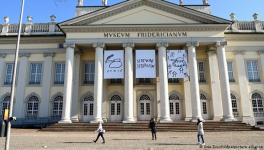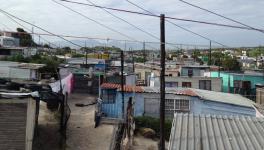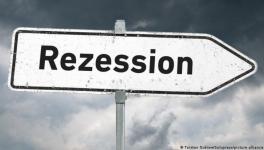Unions, Political Parties Take South African State to Court Over Severe Power Cuts
NUMSA members picket outside the North Gauteng High Court as it hears a case against load shedding. Photo: @SAFTU_Media/Twitter
On Wednesday, March 22, members of the National Union of Metalworkers of South Africa (NUMSA) picketed outside the North Gauteng High Court in Tshwane, as it hears a critical case against load shedding this week.
South Africa experienced 200 days of power cuts in 2022, the worst on record, with continued outages costing the economy over $50 million in losses each day, not to mention a serious impact on public infrastructure and services. Conditions have worsened in 2023, with outages lasting up to 8 hours a day reported earlier this year.
The coal-dependent, state-owned company Eskom, which provides around 90% of South Africa’s electricity, has struggled to meet the country’s energy needs, resorting to load shedding, or rolling power cuts, for over 15 years.
As the South African state and Eskom have tried to shift the blame onto one another, with the Minister for Mineral Resources and Energy (MNRE) even accusing Eskom of “actively agitating for the overthrow of the state”, a group of 19 applicants—including NUMSA, political parties such as the United Democratic Movement (UDM), doctors, and civil society and other groups [UDM and Others]—have taken them all to court.
“It is very obvious from the responses of the various participants [Eskom and Others or the respondents], that none of these organs of state want to take responsibility for load shedding,” NUMSA national spokesperson, Phakamile Hlubi-Majola, told Peoples Dispatch.
“All of them were aware of the 1998 White Paper [on the Energy Policy of the Republic of South Africa], which predicted that Eskom would have a dire shortage of capacity [specifically that “Eskom’s present generation capacity surplus will be fully utilized by 2007”], and steps must be taken to build the capacity up. But all these organs of state failed to implement the changes, and now we are all suffering.”
As such, the case contends that the present electricity crisis can be attributed to a) the failure of the state to maintain the grid and create new generation capacity, especially since Eskom had been stripped of regulatory power, and b) the “derelict management” of Eskom by its now former head, André De Ruyter.
The application adds that load shedding post-2018 is also additionally attributable to the lack of maintenance of Eskom’s existing fleet of power stations, especially as De Ruyter turned his focus towards the “Just Energy Transition Program”.
“There are human rights violations taking place as a result of the failure to mitigate against this crisis and the courts have a duty to assist us in holding the government to account,” Hlubi-Majola stressed.
The case is divided into two parts: Part A, which seeks urgent interdict relief, calls upon the court to exempt public health institutions, schools, telecommunication networks, police stations, water and sanitation services, and all micro and small businesses trading in perishable goods from load shedding.
The applicants have also proposed an alternative relief, under which Eskom and the Minister for Public Enterprises would be legally obliged to procure “alternative sources of electricity and/or energy” for the sectors and establishments mentioned.
Hearings on Part A began before a full bench of judges on March 21.
Meanwhile, Part B, which will be for final relief and is expected to be heard in May, seeks a comprehensive review of the actions of the government, ministers, President Ramaphosa, and Eskom, specifically the failure to uphold their respective constitutional and statutory obligations to ensure a reliable supply of electricity.
Advocate Tembeka Ngcukaitobi SC spoke to these obligations while delivering his opening remarks on behalf of the applicants, including the Eskom Conversion Act under which the Minister for Public Enterprises must enter into a Shareholder compact with Eskom, which must take into account the company’s “developmental role” [Section 6(5)].
“This is important because Eskom is coming from an era in which there was electricity apartheid, and its obligation was to close that electricity apartheid by ensuring, [under] (b) [of Section 6(5)], the promotion of universal access to affordable electricity”.
Load shedding worsens existing inequality
UDM and Others have argued that the respondents’ failure to provide electricity goes against the responsibility of the State and “all other entities and persons to desist from preventing or impairing the right of access to a number of entrenched constitutional rights”.
This includes the right to life and access to health care, which are enshrined in the Bill of Rights.
According to the application, 80% of South Africans rely on public health care. “The human cost of load shedding was highlighted particularly by the Health and Allied Indaba Trade Union and Dr. Lufuno Rudo Mathivha from the Chris Hani Baragwanath Hospital, who have given detailed affidavits of shocking experiences of health workers, and also of the conditions of public hospitals, and how rolling blackouts actually worsen conditions to the extent that they create life-threatening situations.” Hlubi-Majola said.
“Patients are dying because of load shedding. And when faced with such an outcome, the courts and the government cannot turn a blind eye.”
Similarly, the applicants have argued that load shedding infringes upon the constitutionally-guaranteed right to education, especially in the context of entrenched disparities which are themselves a legacy of apartheid.
“The transformative content of the right to education in South Africa is wholly defeated and made impossible under load shedding, which widens rather than bridges the inequalities in our education system.”
What has emerged is a “situation where poor and Black students, who are fully reliant on public education and township schools in particular, are quickly falling several years behind their wealthier and white counterparts who can afford to attend private school.”
The application further argues that load shedding’s impact on all services and sectors, including water and sanitation, for which it has sought an exemption poses similar challenges to the exercise of other rights enshrined in the constitution.
Despite having declared a “state of disaster” over the energy crisis in February, President Ramaphosa stated in his answering affidavit that the neither he nor the national government had a constitutional obligation to end load shedding, in part due to the fact that there was no “justiciable right to electricity under the Constitution.”
However, the applicants have argued that it is precisely because of the president’s obligation to “respect, protect, promote, and fulfill” the rights in the Bill of Rights (and broadly the Constitution), that he must respond to the “humanitarian crisis” of load shedding.
And this is because, as stated elsewhere in the application, “the fundamental rights entrenched in the Bill of Rights, most notably, the right to life, cannot be given effect to without electricity,” as has been clearly demonstrated in conditions in public hospitals.
Hearings on the matter will continue in court on March 23.
Get the latest reports & analysis with people's perspective on Protests, movements & deep analytical videos, discussions of the current affairs in your Telegram app. Subscribe to NewsClick's Telegram channel & get Real-Time updates on stories, as they get published on our website.









